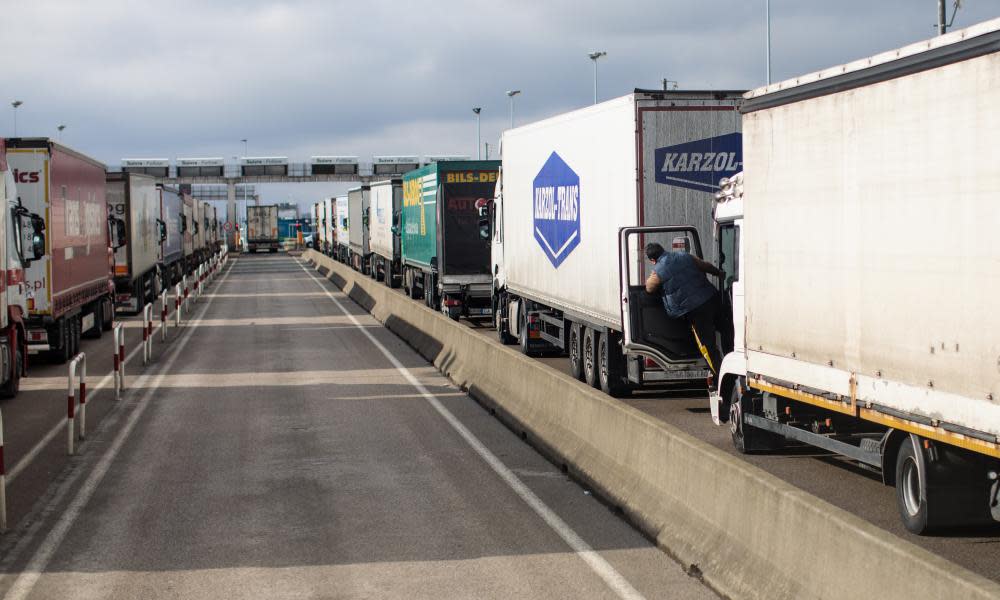Dover checks ‘would take eight hours per lorry’ in no-deal Brexit

Government plans for customs checks at Dover in a no-deal scenario are so impractical it would take eight hours to clear an average lorry carrying food and goods from Calais, the Road Haulage Association has warned.
It said plans for no-deal Brexit were “dire” and the sector faced a catastrophe on 30 March.
“The government is in denial about the scale of this,” said Rod McKenzie, director of policy at the RHA, which represents major hauliers including Eddie Stobart and DHL.
He was speaking after a special summit to discuss Dover and Calais organised in France on Monday by the former French minister and president of the Hauts-de-France region Xavier Bertrand.
Hauts-de-France includes Calais, France’s largest passenger port, Boulogne-sur-Mer, its biggest fishing port and Dunkirk, a major cargo port.
Bertrand said the French are so concerned about no-deal, they are going ahead with arrangements to keep traffic flowing in Calais.
“Our main interest is to protect jobs,” he said. “It is also really crucial we avoid having a commercial war in fisheries.’
Bertrand, who has previously made his frustration at the lack of planning for Dover-Calais known, said he decided to take control of the situation this summer to stop an “economic catastrophe” in the absence of high-level political action.
“I am convinced that we can avoid this catastrophic scenario. But we don’t have much time left,” he warned.
Hauliers were impressed by what they heard in Lille on Monday but said much more needed to be done in Britain.
As it stands, each haulier entering Britain will be required to submit a 40-field declaration form per consignment before travel.
“The form takes 10 minutes to fill out. If you take a large retailer who has 8,000 consignments [in one lorry], that would take 170 people eight hours to process one trailer,” said Richard Burnett, RHA chief executive.
“That is the worst-case scenario. But even if you took the average trailer which has 400 consignments per delivery, that would take nine people eight hours to process.”
“I can’t for the life of me see how this is going to work,” Burnett added, pointing out that 11,000 trucks a day use Dover, triple the amount pre-single market in 1993.
Bertrand said his ambition was a “win-win strategy” and a new relationship between the UK and France.
“I told Angela Merkel and Emanuel Macron in November that problems in our region are not just problems for us, but for France and Europe as a whole,” said Bertrand.
“It is very important to accelerate preparations at a national level. The lorries that will be stopped at the Franco-British border in Calais and elsewhere are not those just for the region but for the whole of Europe and companies that will be blocked from trading will be from the whole of Europe, so delays will affect all countries,” he said.
Bertrand said there would be temporary border inspection posts for food controls in place for April and that recruitment had begun for the first batch of 250 customs officials.
The region was also working on a “fastpass” virtual queuing system to counter stop-start congestion.
He described as “fake news” claims by British politicians that trucks from the EU could simply be waved through customs in an emergency period to maintain a “free flowing” border.
“There will be controls for the very simple reason on food, we can’t just have a situation where there are literally no controls.
“It is also very important to say that no country in Europe will be more lenient on rules because rules are determined at the EU level. Any country that says that it will have less stringent rules, that cannot be true,” said Bertrand.
He called the meeting in Lille out of a sense of urgency. It brought together key officials including representatives of the UK government’s border delivery group and the director of customs in France, who had not met before.
Bertrand said the French plans needed to be backed up by an international strategy to communicate with all freight and haulage interests across the EU27.
“We need to tell companies locally in France and across Europe about changes that will take place at the border on customs and encourage companies to register the goods that they are trading as early as possible in the process rather than doing everything at the border ... We need to mobilise everybody to avoid that catastrophe,” he said.
A spokesman for HMRC said traders would submit customs declarations before transit to avoid delays.
He said while no-deal would be a challenge, HMRC had “well developed plans” to ensure “functioning customs, VAT and excise system” in such a scenario.
“HMRC will continue to work closely with industry to ensure interventions are carried out in a way that minimise delays and additional burdens for legitimate trade, while robustly ensuring compliance,” said the spokesman.

 Yahoo News
Yahoo News 
